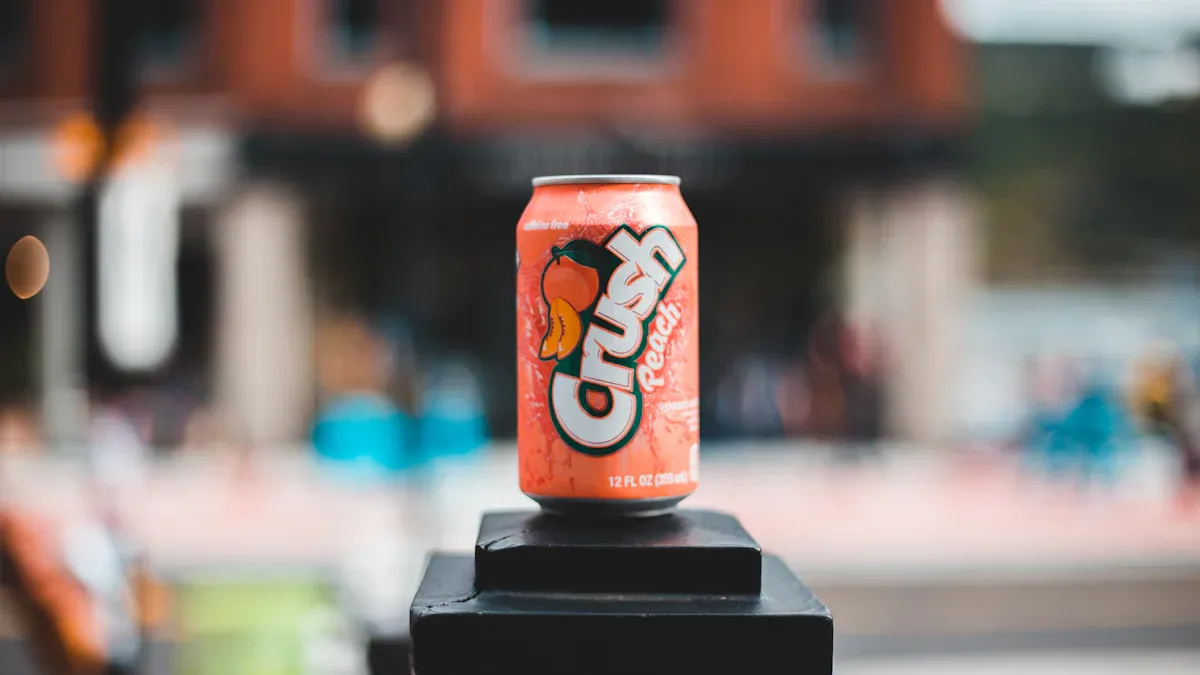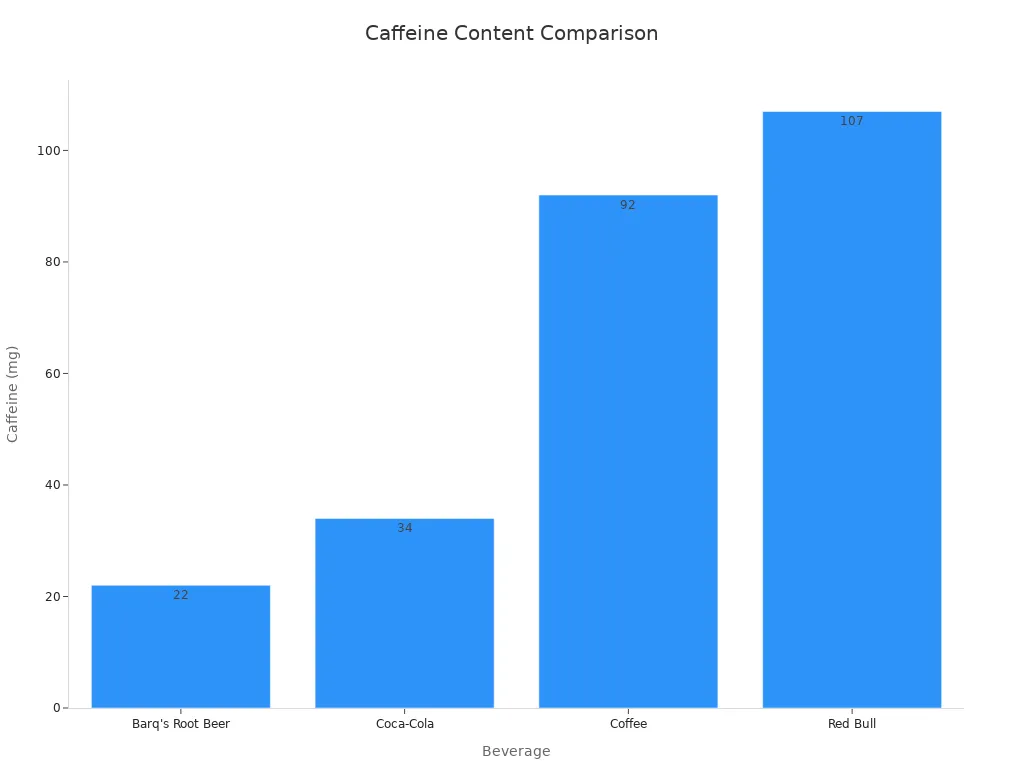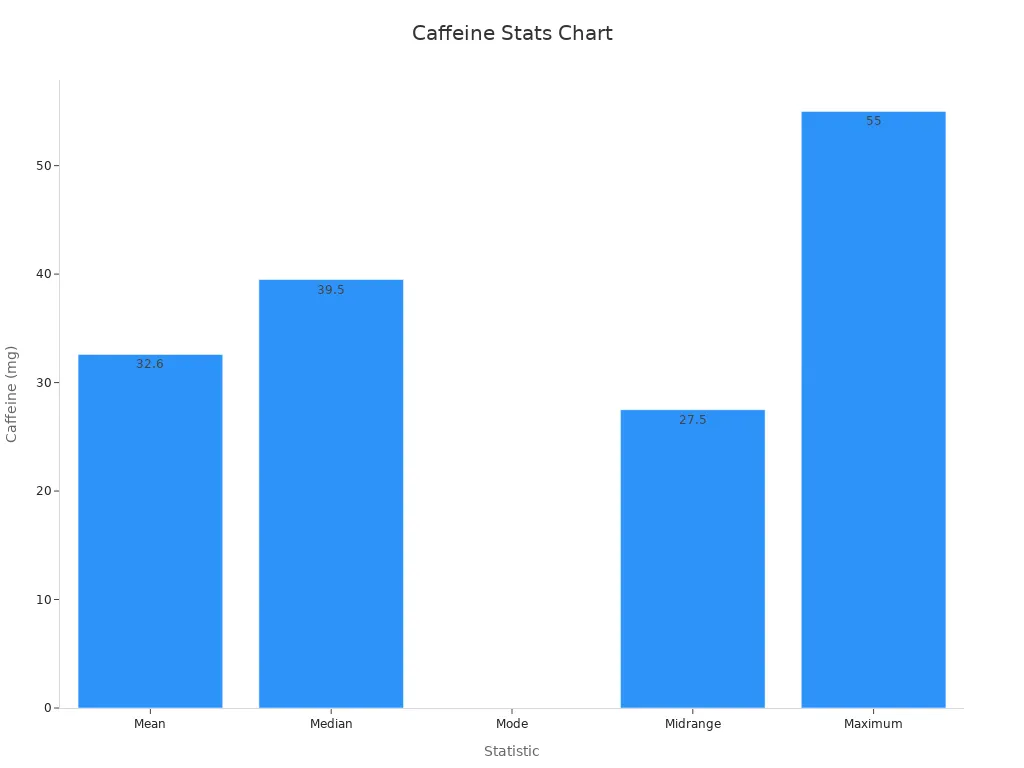When you wonder does root beer have caffeine, the answer is usually no. Most root beer does not contain caffeine. Popular brands like Sprecher Brewery, A&W, Mug, and Dad’s all state their root beer is naturally caffeine-free, following traditional recipes. Only a few brands, such as Barq’s, include caffeine in their root beer, but even then, the caffeine content is much lower than that found in coffee or tea. It’s always important to check the label because recipes can change.
Key Takeaways
Most root beer brands, like A&W and Sprecher, do not have caffeine. They use natural roots and herbs for flavor. Barq’s root beer is different because it has caffeine. But its caffeine level is much lower than coffee or many sodas. Always check the label for caffeine information. Recipes can change, and the FDA says caffeine must be listed if added. Picking caffeine-free root beer lets you enjoy a sweet, fizzy drink. You do not have to worry about caffeine effects. Manufacturer websites and clear labels help you make safe choices. They help you know about caffeine in root beer.
Does Root Beer Have Caffeine
Natural Ingredients
If you wonder if root beer has caffeine, check what is in it. Most root beer gets its taste from roots, herbs, and spices. Some common things used are sassafras root, sarsaparilla root, licorice root, wintergreen, birch bark, and vanilla. These natural things make root beer taste special.
Scientists say sassafras root, used in many old recipes, does not have caffeine. They studied sassafras teas and found no caffeine in them. Instead, they looked at other things like safrole. Health experts also say sassafras tea, made from the roots or leaves, has no caffeine. So, when you drink root beer with these things, you are picking a drink that is naturally caffeine-free.
Tip: If you want to stay away from caffeine, pick root beer brands with old-style ingredients. These brands often talk about using real roots and herbs.
Traditional Recipes
You may ask if root beer has caffeine if it uses old recipes. The answer is no. History shows root beer started as a homemade drink. People used roots like sassafras and sarsaparilla, plus other herbs and spices. These things do not have caffeine.
Root beer has been around in America for a long time. Early recipes came from health teas and small beers. Charles Hires, one of the first people to sell root beer, used only powdered roots, bark, and herbs. He did not put in caffeine. Most root beer brands today still use these ways.
The Tastewise 2025 Root Beer trends report says most root beers still do not have caffeine. The report also says many people pick root beer for its old-time taste and natural things. You can drink root beer as a sweet, fizzy treat and not worry about caffeine.
If you ever wonder if root beer has caffeine, remember that old recipes and natural things make most root beer safe for people who do not want caffeine.
Caffeine-Free Root Beer
![Caffeine-Free Root Beer]()
Common Brands
You have many choices when you want a caffeine-free root beer. Some of the most popular brands in the United States include:
A&W
Mug
Dad's
IBC
Culver's
Sprecher Root Beer
These brands lead the caffeine-free root beer market. A&W, Mug, and Dad's Root Beer are key players. Large companies like PepsiCo and Keurig Dr. Pepper own these brands. They invest in new products and marketing to keep their root beer popular. The North American market, especially the U.S., has the highest demand for caffeine-free root beer. You can find these brands in supermarkets and online stores. Sprecher Root Beer stands out for its use of real ingredients and traditional recipes. Many people choose Sprecher Root Beer because it offers a classic taste without caffeine.
Note: Non-alcoholic root beer, which includes Sprecher Root Beer, makes up most of the global root beer sales. Health trends push companies to create more caffeine-free and diet options.
You may notice that Sprecher Root Beer appears in many lists of top caffeine-free choices. This brand uses natural roots and herbs, following old recipes. You get a rich, smooth flavor with Sprecher Root Beer, and you do not have to worry about caffeine.
Label Tips
When you pick a root beer, always check the label for caffeine information. Most caffeine-free root beer brands, like Sprecher Root Beer, clearly state "caffeine-free" on the packaging. The American Beverage Association encourages companie to label caffeine content. The FDA also has rules for labeling caffeine, especially if it is added. If a root beer contains caffeine, the label must list it as an ingredient.
Look for "caffeine-free" on the front or near the Nutrition Facts panel.
If you see Sprecher Root Beer, you can trust it is caffeine-free, but still check the label for changes.
Companies may add advisory statements if the drink contains caffeine.
Tip: Always read the ingredient list. Even though most traditional root beer, like Sprecher Root Beer, does not have caffeine, recipes can change.
You can feel confident choosing Sprecher Root Beer or other well-known caffeine-free brands. Accurate labeling helps you make safe choices, especially if you want to avoid caffeine.
Caffeinated Root Beer Brands
Barq’s and Others
You may notice that most root beer brands do not add caffeine. However, Barq’s stands out as a well-known exception. Barq’s root beer has included caffeine since its creation in 1898. Edward Barq wanted his drink to have a bubbly, caffeinated kick, so he added caffeine to the original recipe. This choice made Barq’s different from other root beers, which usually stay caffeine-free. Over the years, Barq’s kept this unique formula, and it still contains caffeine today.
If you look for other root beer with caffeine, you will find very few options. Most brands, such as A&W, Mug, and IBC, do not add caffeine. Barq’s remains the most popular caffeinated root beer in stores. Always check the label if you want to avoid caffeine, because recipes can change.
Note: Barq’s is the main root beer brand that contains caffeine. Most other root beers are caffeine-free, but you should always read the label to be sure.
Caffeine Amounts
You might wonder how much caffeine is in Barq’s compared to other drinks. The caffeine content in Barq’s root beer is about 22 mg per 12-ounce can. This amount is much lower than what you find in sodas like Coca-Cola or in coffee and energy drinks. The table below shows how Barq’s compares to other popular beverages:
Beverage | Serving Size | Caffeine Content (mg) |
Barq's Root Beer | 12 oz can | 22 |
Coca-Cola | 12 oz can | 34 |
Coffee | 8 oz cup | 92 |
Red Bull | 12 oz can | 107 |
![Bar chart comparing caffeine content across multiple beverages.]()
The FDA says you should not have more than 400 mg of caffeine each day. A can of Barq’s root beer with caffeine is far below this limit. If you want a caffeinated drink but do not want too much caffeine, Barq’s can be a good choice. Remember, most root beer does not contain caffeine, so Barq’s is special in this way. Always check the label if you want to know the caffeine content in your drink.
Comparing Caffeine in Root Beer and Sodas
Caffeine Levels
You may wonder how the caffeine content in root beer compares to other sodas. Most root beer brands do not contain caffeine. Barq’s is a well-known exception. When you look at the numbers, you see that Barq’s root beer caffeine content is much lower than many popular sodas. For example, Pepsi and Coca-Cola have more caffeine per can. Mountain Dew has even more. Many sodas, like Sprite and 7up, have no caffeine at all. The table below shows how different drinks compare:
Beverage | Caffeine Content (mg per 12 oz) |
Barq’s Root Beer | 22 |
Pepsi | 38 |
Coca-Cola Original | 34 |
Dr. Pepper | 41 |
Mountain Dew | 54 |
Pepsi Zero Sugar | 69 |
7up | 0 |
Sprite | 0 |
Crush Orange Soda | 0 |
You can see that Barq’s root beer sits on the low end of the caffeine scale. Most other root beer brands have zero caffeine. The average caffeine content across many soda brands is about 32.6 mg per 12 ounces. The most common amount is actually zero, which means many sodas, especially root beer, are caffeine-free.
![Bar chart comparing caffeine statistics across soda brands]()
Choosing a Drink
You have many choices when you want a drink. Nearly 70% of Americans enjoy at least one caffeinated beverage each day. People pick drinks for different reasons. Some like the taste, while others want to feel more alert or enjoy a daily routine. Younger people often choose drinks to boost mood or focus. Older adults may drink them for comfort or habit.
Coffee, soft drinks, and tea are the most popular sources of caffeine.
Most people drink soda for the taste and comfort it brings.
Many people do not know the safe daily limit for caffeine, which is 400 mg.
Product labels, health websites, and doctors help people learn about caffeine safety.
If you want to avoid caffeine, you can choose most root beer brands. If you want a small amount, Barq’s root beer gives you less than colas or energy drinks. Always check the label to see if your drink is caffeinated. This helps you make the best choice for your needs.
How to Check for Caffeine
Reading Labels
You can learn a lot about your drink by reading the label. When you pick up a can or bottle of sprecher root beer, look for the ingredient list. The FDA requires companies to list caffeine as an ingredient if they add it to the product. This rule covers sodas like root beer with added caffeine. However, the FDA does not make companies show the exact amount of caffeine on the label for soft drinks. You may see "caffeine" listed, but not the number of milligrams.
Tip: Always check the front or side of the sprecher root beer label for a "caffeine-free" statement. Many brands, including sprecher root beer, add this to help you choose.
Consumer Reports tested many drinks and found that some did not list caffeine amounts at all. Sometimes, the actual caffeine content was different from what the label said. This means you should not rely only on the label. If you want to be sure, look for brands like sprecher root beer that clearly state "caffeine-free." You can also check the ingredient list for any mention of caffeine.
Here is a quick guide to what you might see on labels:
Product Type | Caffeine Listed as Ingredient | Caffeine Amount Listed | Example |
Sodas with added caffeine | Yes | No | Barq's Root Beer |
Sodas with no added caffeine | No | No | sprecher root beer |
Foods with natural caffeine | No | No | Chocolate |
Over-the-counter caffeine products | Yes | Yes | NoDoz |
Manufacturer Info
You can also check the manufacturer's website for more details. Many companies, like the makers of sprecher root beer, share information about their products online. For example, the official sprecher root beer page explains that their root beer is caffeine-free. This helps you make safe choices if you want to avoid caffeine.
Barq's Root Beer lists caffeine as an ingredient and gives the exact amount per serving. The Coca-Cola website says Barq's has 22 mg of caffeine in a 12-ounce can. This kind of information comes straight from the company, so you can trust it. When you look up sprecher root beer, you will see that it does not have caffeine. The company uses real roots and herbs, following traditional recipes.
Note: If you cannot find caffeine information on the label, visit the sprecher root beer website or contact customer service. They can answer your questions and help you choose the right drink.
You can feel confident when you pick sprecher root beer. The company makes it easy to find out if their root beer has caffeine. Always check both the label and the manufacturer's website to stay informed.
You now know that most root beers, such as A&W, Mug, and Dad’s, do not have caffeine. Barq’s root beer is different and contains about 22 mg of caffeine in a 12-ounce can. The FDA requires companies to list added caffeine on labels, but not the exact amount. Always read the label before you buy. This helps you avoid unwanted caffeine and make the best choice for your health.
FAQ
Does all root beer have caffeine?
No, most root beer brands do not have caffeine. You will find that only a few, like Barq’s, add caffeine. Always check the label to be sure.
Why does Barq’s root beer have caffeine?
Barq’s adds caffeine to stand out from other root beers. The company wanted to give you a little energy boost. Most other brands do not add caffeine.
How can you tell if root beer is caffeine-free?
You should look for “caffeine-free” on the label. If you do not see it, check the ingredient list for caffeine. You can also visit the brand’s website for more details.
Is caffeine in root beer safe for kids?
Most root beer is safe for kids because it does not have caffeine. If you choose Barq’s or another caffeinated brand, remember that the caffeine amount is low. Always check with your doctor if you have concerns.
Can you drink root beer at night?
Yes, you can drink most root beer at night because it does not have caffeine. If you pick Barq’s, remember it has a small amount of caffeine, which may affect your sleep.






























